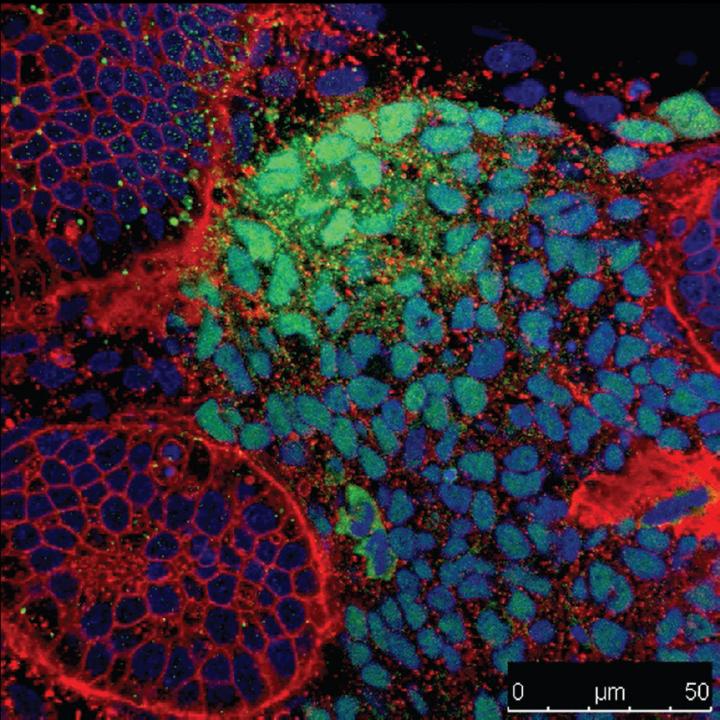Novel stem cell line avoids risk of introducing transplanted tumors
Human pluripotent stem cells (hPSC) can become any type of cell in the adult body, offering great potential in disease modeling, drug discovery and creating replacement cells for conditions ranging from cardiovascular to Alzheimer's disease.
But that promise comes with a risk: the possibility that transplanted hPSCs might also develop as unwanted tumors. In a new study published November 10, 2015 in the online journal eLIFE, researchers at University of California, San Diego School of Medicine describe a new "progenitor cell" capable of unlimited expansion and differentiation into mature kidney cells, but without the risk of forming tumors.
"This work nicely complements recent advances in tissue engineering and the goal of rebuilding or recreating functional organs, such as what we've seen with the creation of 'mini-kidneys'," said senior author Karl Willert, PhD, associate professor in the Department of Cellular and Molecular Medicine at UC San Diego. "It represents a novel source of cells."
Willert, with co-corresponding author David Brafman, PhD, at Arizona State University, and colleagues engineered an in vitro microenvironment that permitted homogenous expansion of hPSC progenitor cells from the mesoderm - one of the three primary germ layers in early embryonic development. A germ layer is a primary layer of cells that form during embryogenesis. Progenitor cells are early descendants of stem cells, with more limited differentiation capacity.
Analyses showed that these newly created "mesoderm progenitors" lacked tumor-forming potential, but retained the capacity to differentiate into specific kinds of tissue, such as cells that comprise the adult kidney.
The researchers said the ability to generate expandable populations of progenitor cells with limited differentiation presents several advantages over the use of undifferentiated human stem cells:
First, cultures derived from the latter often harbor undifferentiated cells that retain the potential to seed tumor growth.
Second, development and manipulation of lineage-restricted progenitors is less elaborate. It's easier to create mature cell populations for research or therapeutic use.
Third, because progenitor cells are limited in what kind of cell they can be, they are less likely than stem cells to differentiate into an unwanted cell type.
"Our cells can serve as building blocks to generate kidneys that may one day be suitable for cell replacement and transplantation," said Willert. "I think such a therapeutic application is still a few years in the future, but engineered kidney tissue can serve as a powerful model system to study how the human kidney interacts with and filters drugs. Such an application would be of tremendous value to the pharmaceutical industry."
Willert noted that the progenitor cells developed are likely capable of differentiating into other cell types of the intermediate mesodermal lineage as well, most notably the germ line to generate eggs and sperm in a dish. "We have only characterized their potential to differentiate into cells that contribute to the kidney. We are now investigating to what extent these cells can generate other tissues and organs that derive from intermediate mesoderm, including reproductive organs."
He said colleagues are also pursuing similar bioengineering-based approaches to generate other similar expandable progenitor cell populations capable of differentiation into mature cell types derived from other germ layers.
Source: University of California - San Diego
Stem Cell Research
-
In some genetic cases of microcephaly, stem cells fail to launch
-
Embryonic gene Nanog reverses aging in adult stem cells
-
Gene controls regeneration of injured muscle by adult stem cells
-
Breakthrough in scaling up life-changing stem cell production
-
New procedure allows long-term culturing of adult stem cells
-
Stem cell transplant from young to old can heal stomach ulcers
-
Scientists discover oldest plant root stem cells
-
Penn bioengineers show why lab-made stem cells might fail: Errors in DNA folding
-
Stem cell therapy improves outcomes in severe heart failure
-
A quartet of genes controls growth of blood stem cells
-
New way to harvest stem cells better for donors
-
Oncogene controls stem cells in early embryonic development
-
Hacking the programs of cancer stem cells
-
Combining adult stem cells with hormone may speed bone fracture healing
-
Discovery of an embryonic switch for cancer stem cell generation



